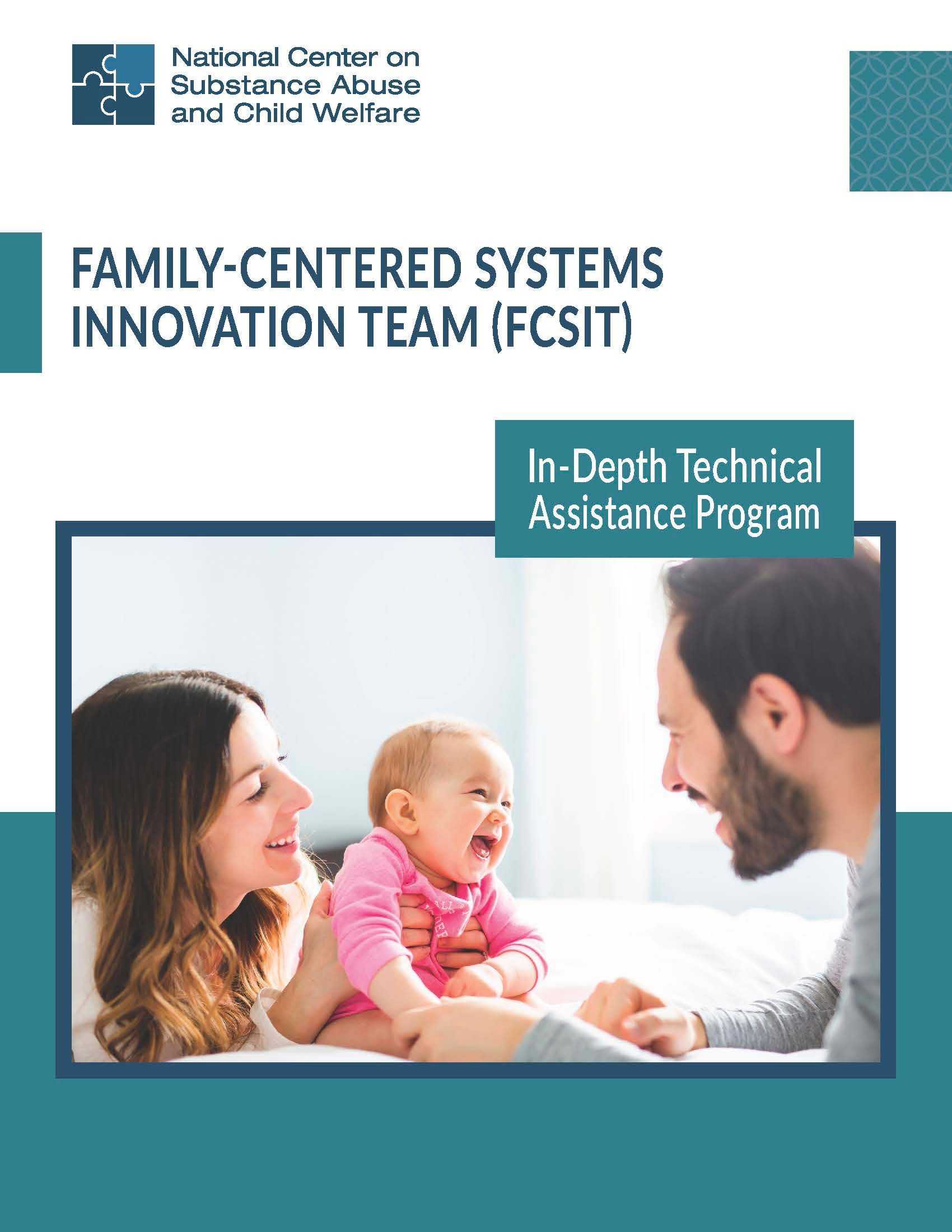Family-Centered Systems Innovation Team
In-Depth Technical Assistance
Through its In-Depth Technical Assistance (IDTA) Program, the Family-Centered Systems Innovation Team (FCSIT) assists states, Tribes, and community partner agencies in implementing the 2016 Comprehensive Addiction and Recovery Act (CARA) amendments to the Child Abuse Prevention and Treatment Act (CAPTA), Public Law 114-198.
FCSIT focuses on improving the safety, health, permanency, well-being, and recovery outcomes of families affected by substance use and co-occurring mental health disorders. This specialized team helps states develop state policies and practice protocols in five critical areas identified in CARA amendments to CAPTA:
- Infants and their families identified as being affected by prenatal substance exposure
- Development of Plans of Safe Care (POSC)
- Cross system collaboration
- Establishing a comprehensive service array
- Substance use and mental health treatment
FCSIT improves cross-agency collaboration among substance use and mental health disorder treatment centers, child welfare and court systems, and their partners. The improved collaboration reduces duplication of effort, increases effective communication, saves resources, and increases the number of infants who can safely remain with their parents while reducing the need for child welfare protective custody.
The IDTA model provides communities with tailored, phased support for sustainable policy and practice changes through targeted training, technical assistance, and coaching. The customized approach has resulted in sites increasing their capacity to improve the safety, health, permanency, well-being, and recovery outcomes for families affected by substance use and mental health disorders.

View Site Profiles
The map below highlights past and present participating states. Profiles for current states are coming soon. For further information on IDTA sites, contact NCSACW@cffutures.org
undefined (undefined)
past
- |
current
- |
Show All
No Results
Highlighted Resource
In-Depth Technical Assistance Program Description

National Center on Substance Abuse and Child Welfare, 2022
Provides an overview of the National Center on Substance Abuse and Child Welfare’s (NCSACW) In-Depth Technical Assistance (IDTA) program
...(Read More)Policy and Practice Resources
Implementing a Family-Centered Approach in Outpatient Treatment
National Center on Substance Abuse and Child..., 2025
This resource is for outpatient treatment providers to understand 1) the principles and benefits of a family-centered approach and
... (Read More)Collaborating Across Service Systems: How to Develop a Comprehensive Data Approach for Families Affected by...
National Center on Substance Abuse and Child..., 2024
This series is intended for state child welfare and partner agencies (e.g., public health, maternal and child health, substance use
... (Read More)Cannabis Use During Pregnancy: What Professionals Working with Pregnant Women Need to Know
National Center on Substance Abuse and Child..., 2024
Provides information about the effects of cannabis use on fetal and neonatal health, how to develop a Plan of Safe Care (POSC) and
... (Read More)Building Hope for Families Affected by Substance Use and Mental Health Disorders: A Blueprint for an Effect...
National Center on Substance Abuse and Child..., 2023
This series describes concrete strategies collaboratives can use to enhance the system of care while improving outcomes for families
... (Read More)In-Depth Technical Assistance Program Description
National Center on Substance Abuse and Child..., 2022
Provides an overview of the National Center on Substance Abuse and Child Welfare’s (NCSACW) In-Depth Technical Assistance (IDTA) program
... (Read More)Sustainability Planning Toolkit - Five Steps to Build a Sustainability Plan for Systems Change
National Center on Substance Abuse and Child..., 2021
Provides collaboratives, organizations, and programs with the tools needed for planning and implementing a sustainability approach for
... (Read More)Plans of Safe Care Learning Modules Series
National Center on Substance Abuse and Child..., 2020
A five-part series on POSC for infants born with and identified as affected by substance abuse or withdrawal symptoms resulting from
... (Read More)A Collaborative Approach to the Treatment of Pregnant Women With Opioid Use Disorders: Practice and Policy ...
Substance Abuse and Mental Health Services A..., 2016
Provides information on the extent of opioid use by pregnant women as well as the effects on the infant, evidenced-based recommendations
... (Read More)Additional Resources
Child Abuse and Prevention Treatment Act (CAPTA), Prenatal Substance Exposure Statutory Station Summary
National Center on Substance Abuse and Child..., 2017
Covers the history of the CAPTA prenatal exposure provisions, including the July 2016 Comprehensive Addiction and Recovery Act changes.
... (Read More)